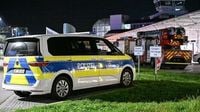Munich’s usually bustling international airport became the unlikely epicenter of Europe’s latest security scare this week, as authorities twice shut down Germany’s second-busiest airport in less than 24 hours following a series of mysterious drone sightings. The unprecedented disruptions, which unfolded on October 3 and 4, 2025, left thousands of travelers stranded and raised urgent questions about airspace security across the continent.
The first sign of trouble came on the evening of October 3, when German air traffic control restricted and then suspended all flight operations at Munich Airport as a precaution after unconfirmed drone sightings. According to a statement on the airport’s website, 17 flights were grounded shortly after 10 p.m., affecting nearly 3,000 passengers. Another 15 arriving flights were diverted to Stuttgart, Nuremberg, Frankfurt, and even Vienna, as planes circled above Munich before being rerouted, according to flight tracking data reported by CNN.
The chaos didn’t end there. Just before 11 p.m., police patrols confirmed two simultaneous drone sightings around the north and south runways, as relayed by a police spokesman to AFP. "The drones immediately moved away, before they could be identified," the spokesman said. The airport, a vital hub for Lufthansa and a gateway for nearly 20 million passengers in the first half of the year, was forced to halt operations for the second time in less than 24 hours.
By the time the airport began a gradual reopening at 5 a.m. local time on October 4, the fallout was clear: 46 departures had been cancelled or delayed, impacting 6,500 passengers. The first plane to land after the disruption was a Lufthansa long-haul flight from Bangkok, touching down at 5:25 a.m., according to the airport’s website. Lufthansa alone cancelled or diverted 19 flights, including three long-haul journeys to Asia, and provided stranded travelers with food, drinks, and blankets. Agency photos captured weary passengers sleeping on rows of camp beds, inflatable mattresses in hand—an image that summed up the night’s confusion and frustration.
These incidents in Munich were not isolated. In recent weeks, airports in Denmark, Norway, and Poland have also suspended flights due to unidentified drones. Denmark, in particular, banned all civil drone flights in its airspace as it prepared to host a summit of European leaders focused on Ukraine and regional security—an extraordinary move that underscored the seriousness of the threat. Danish Prime Minister Mette Frederiksen, quoted by CNN, remarked, "We can at least conclude that there is primarily one country that poses a threat to Europe’s security – and that is Russia."
Authorities across Europe have reported a surge in drone sightings not just near airports, but also over military installations and critical infrastructure. According to a confidential police report cited by Bild and referenced by the Associated Press, drones spotted at Munich Airport were "used militarily," though officials have not disclosed further details or confirmed their origin. Other recent incidents included a drone flying within 700 meters of Frankfurt Airport and a small aircraft over an ammunition depot in northern Germany. In one case, a 41-year-old Croatian man was detained in connection with the Frankfurt sighting, as reported by the Independent.
Meanwhile, the German defense ministry confirmed that drones had been seen flying over the Erding military base near Munich around the time of the first airport closure. Erding is home to some of the German armed forces’ drone research and development, adding another layer of concern. Police have remained tight-lipped about the nature and origin of the drones, while European authorities have been criticized for their slow and sometimes opaque communication about these incidents. In Denmark, for example, authorities received 500 tips about drone sightings in a single day—some of which, embarrassingly, turned out to be stars mistaken for drones.
The mounting unease has prompted swift political action. German Interior Minister Alexander Dobrindt, speaking during a migration-focused summit of European interior ministers in Munich, described the first night’s incident as a "wake-up call" and announced plans to equip police with a dedicated drone defense unit. "We are in an arms race," Dobrindt told reporters, as quoted by the Independent. "We want to rise to that challenge." The German government is expected to sign off on new legislation as early as October 8, 2025, that would allow the army to shoot down drones if necessary—a significant shift in policy reflecting the urgency of the moment.
Across the continent, defense ministers have agreed to develop a so-called "drone wall"—not a physical barrier, but a layered network of detection and interception systems to protect European airspace. This initiative, discussed at the recent Copenhagen summit, aims to bolster the anti-drone capabilities of individual EU members and provide a collective shield against future incursions.
While some European leaders have pointed the finger squarely at Moscow, Russia has firmly denied any involvement. President Vladimir Putin, speaking at the Valdai Discussion Club in Sochi on October 2, dismissed the allegations with characteristic sarcasm. "I will not. I will not [send] any more drones, neither to France nor to Denmark, Copenhagen. Where else do they fly to?" he quipped, according to AFP and CNN. Yet, in the same breath, Putin issued a veiled warning: "We are carefully watching the growing militarization of Europe. Is all of this just words or is it time for us to take countermeasures? No one should have doubt that Russia’s countermeasures will not take a long time to come."
Ukrainian President Volodymyr Zelenskyy, for his part, seized on the drone incidents as evidence of Moscow’s intent to escalate aggression. Speaking on October 2, Zelenskyy warned Europe that the incursions were a sign that Russia was looking to "escalate" its campaign beyond Ukraine’s borders.
The timing of the Munich airport disruptions only heightened tensions. The closures coincided with German Unity Day, a national holiday, and the final weekend of Oktoberfest—a cherished annual celebration that had already been suspended for half a day earlier in the week due to a bomb threat. For many in Munich and beyond, the combination of bomb scares and drone shutdowns felt like a double blow to the city’s sense of security and normalcy.
As investigations continue and governments scramble to shore up their defenses, one thing is clear: the era of drone warfare and aerial sabotage has arrived in Europe’s heartland. Whether these latest incidents are the work of state actors, rogue individuals, or something else entirely, the response from officials and the public alike has been swift and sobering. For now, Munich’s runways are open and the Oktoberfest crowds have returned, but the specter of unseen threats above remains—and with it, a new urgency to protect Europe’s skies.




